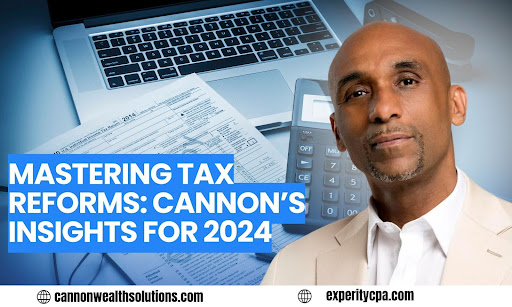Robert Cannon Explores the Implications of 2024 Tax Reforms
In 2024, The American tax year will be quite different than before. The United States braces for a series of sweeping tax reforms that promise to reshape the financial landscape for taxpayers nationwide. These reforms, born out of the necessity to adapt to the evolving economic conditions and legislative advancements, are poised to introduce significant shifts in the taxation paradigm. At the heart of this transformation is Robert Cannon, a distinguished financial expert from ExperityCPA.com, who brings to the table a wealth of knowledge and insight into the impending changes and their broader implications for financial planning and strategy.
Retirement Savings Evolution
Among the hallmark changes is the SECURE 2.0 Act of 2022, a legislative milestone that heralds a new era in retirement savings. This act is meticulously crafted to bolster the retirement savings framework, featuring innovative provisions that enhance the flexibility and accessibility of retirement funds. Notably, it introduces mechanisms for penalty-free early withdrawals in certain dire situations, such as domestic abuse and financial emergencies, striking a balance between providing immediate financial relief and maintaining the sanctity of long-term retirement objectives.
Innovative Retirement Account Flexibility
The tax reforms further revolutionize retirement planning through the introduction of tax-free rollovers from 529 education savings plans to Roth IRAs. This groundbreaking provision paves the way for a strategic reallocation of unused education funds, offering families a novel approach to fortifying their retirement savings. The elimination of required minimum distributions for Roth 401(k) plans is another stride towards simplification and efficiency in retirement savings, potentially transforming the retirement planning process for countless Americans.
Increased Contribution Limits and Phaseouts
In an acknowledgment of inflation’s impact on savings, the 2024 tax reforms adjust the contribution limits for pivotal retirement accounts, such as 401(k)s and IRAs. These adjustments are designed to empower taxpayers to bolster their retirement savings, providing a critical countermeasure against the erosive effects of inflation. Additionally, the recalibration of phaseouts for IRA contributions and deductions highlights the intricate dance of tax planning, emphasizing the importance of strategic foresight in leveraging tax benefits to the fullest extent.
Tax Credits and Deductions: Enhancing Accessibility and Affordability
The reforms are characterized by significant updates to tax credits and deductions, aimed at fostering accessibility and affordability across various facets of taxpayer lives. The reformation of the federal electric vehicle (EV) tax credit to allow immediate benefits at the point of sale is a testament to the government’s commitment to environmental sustainability and economic accessibility. Similarly, the adjustments to the adoption credit and the standard deduction amounts are reflective of a broader strategy to accommodate the diverse financial needs of the American populace.
The Imperative of Strategic Financial Planning
Robert Cannon’s analysis underscores the critical need for a strategic approach to navigating the 2024 tax changes. With the tax landscape in flux, individuals and businesses are urged to remain vigilant, informed, and adaptable. “The forthcoming tax year is fraught with both challenges and opportunities. To optimize our financial outcomes, we must engage with these changes proactively, armed with knowledge and strategic planning,” Cannon asserts. This sentiment echoes the broader consensus among financial experts, emphasizing the value of informed decision-making in an era of financial transformation.
Embracing Change: The Path Forward
The 2024 tax reforms represent a complex amalgamation of challenges and opportunities for taxpayers. Cannon’s expert analysis, coupled with the resources available at ExperityCPA.com, offers a beacon for those navigating this tumultuous landscape. The path forward demands more than mere adaptation; it calls for a reimagining of financial strategies, embracing the changes as catalysts for innovation and growth. For insights into global tax reform impacts, see this study on Rwanda’s tax reform.
As we stand on the precipice of these significant tax reforms, the message is clear: the future of financial planning is dynamic, requiring an agile and informed approach to tax strategy. Through the lens of Robert Cannon’s expertise, taxpayers are afforded a glimpse into the intricacies of the 2024 tax reforms, enabling them to navigate the evolving financial seas with confidence and strategic acumen.
In conclusion, the 2024 tax reforms are set to usher in a new era of financial planning and strategy. Through strategic adaptation and informed decision-making, individuals and businesses can position themselves to thrive amidst the changes. The insights provided by Robert Cannon, alongside the resources at ExperityCPA.com, serve as invaluable tools in this journey, guiding taxpayers towards a prosperous financial future in the face of evolving tax landscapes.

